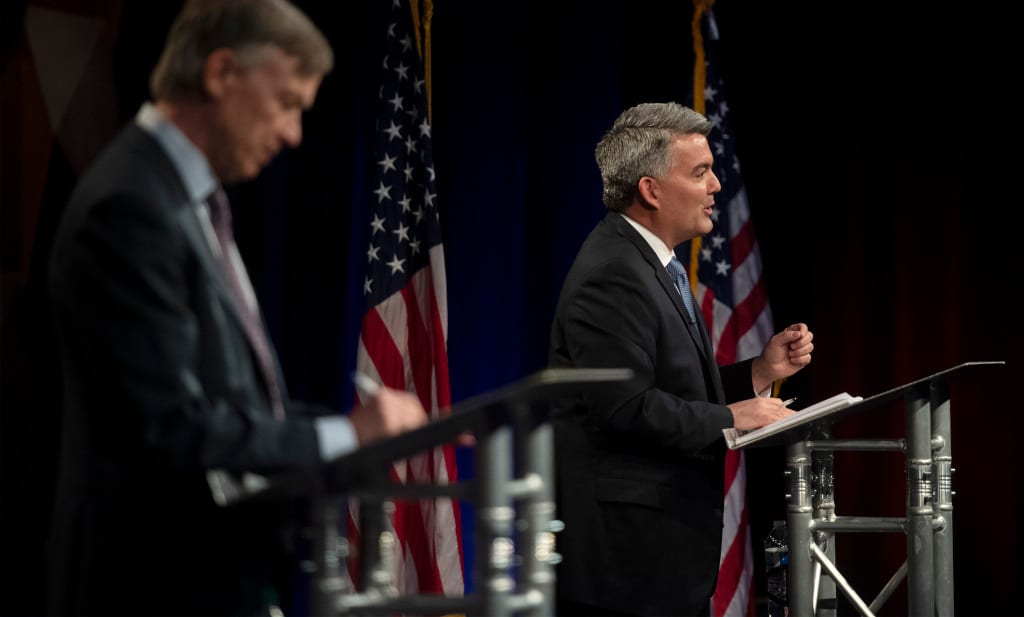John Hickenlooper was winning before he was running.
On Aug. 13, 2019, a poll showed the Democrat with a 13-point advantage over Republican Sen. Cory Gardner. A week later, Hickenlooper entered the race. On Tuesday night, he won it handily.
The reasons for that are numerous. They span from the macro — the coronavirus pandemic, the president’s unpopularity — to the micro, such as ad strategy and debate performances.
In the end, Gardner was unable to escape from under the weight of President Donald Trump and Colorado’s increasingly Democratic electorate. In key moments, his critics say, he didn’t try to. Hickenlooper, meanwhile, overcame an embarrassing ethics ruling that ultimately did little to hurt his electoral odds.
“Colorado has changed a lot since 2014” — the year Gardner first won a seat in the Senate — “and because of Trump’s unpopularity here, Gardner was in a very tough, if not intractable, situation,” said Kyle Saunders, a professor of political science at Colorado State University.
Trailing in the polls and hit with a barrage of outside spending, Gardner’s prospects looked dim as 2019 ended and the first several months of 2020 passed. But a Republican-authored ethics complaint against Hickenlooper began to bear fruit in the spring, fertilized by Hickenlooper’s own unusual decision-making.
In the weeks before Democratic primary voters decided between Hickenlooper and Andrew Romanoff, Hickenlooper refused to appear at a virtual hearing of the Independent Ethics Commission, fought a subpoena in court, lost in court, refused to comply with the subpoena, was held in contempt by the IEC, and was found to have twice violated the state’s gift ban. The series of unforced errors earned the candidate negative headlines and left political observers scratching their heads.
Gardner and his allies saw an opening. Outside GOP groups poured money into Colorado as ballots went out to Democratic voters. Negative ads hit the airwaves highlighting Hickenlooper’s dismal June. At the end of the month, Hickenlooper beat Romanoff easily but Republicans had their opening: to paint Hickenlooper, in Gardner’s words, as “the most corrupt governor in the history of Colorado.”
In a different year, it may have worked.
But this is 2020, the year of a global pandemic that has killed hundreds of thousands of Americans, the year of a stark economic downturn, the year of racial and civil unrest. The pandemic in particular highlighted health care, Hickenlooper’s signature issue. The Affordable Care Act, once vilified, was in vogue again.
Gardner caught a small break in August when his Great American Outdoors Act, a significant public lands bill, was signed into law by the president. His ad strategy became two-fold: criticize Hickenlooper’s ethics, and tout the GAOA.
But nothing seemed to move the needle, which remained firmly on Hickenlooper’s side. A September poll showed Gardner within five percentage points of Hickenlooper, but it was an outlier. Other polls that month showed Hickenlooper’s lead holding steady at seven to 10 points over Gardner. They never budged.
“Hickenlooper and his team did exactly what they needed to do: They ran a campaign that highlighted Hickenlooper’s strengths and positive image without making any big mistakes or gaffes,” said Saunders, “while really all they had to do to keep the lead weight of Trump around Gardner’s neck was to show pictures of him with Trump and connect the two in the minds of voters with their ads.”
All that was left were the October debates, which both sides saw as Gardner’s best opportunity to close the gap. Gardner, the much better speaker, went hard after Hickenlooper but with a smile and nod to bipartisanship. Hickenlooper focused on health care, Trump and the state of the nation. When the dust settled, the polls remained stubbornly unmoved. Nothing Gardner did changed the state of the race.
“I don’t think it’s been any secret that there’s a heavy anti-Trump sentiment among unaffiliated voters, and they represent 40% of the electorate,” said Dick Wadhams, a former chair of the Colorado GOP and former campaign manager in Senate elections, on Tuesday night. “And that has affected races up and down the ticket.”
It was Gardner who aligned himself with Trump, endorsing him last year and rallying with him in Colorado Springs this February, creating much material for Democratic ad makers. It was Gardner who, in another widely shared moment, called Trump ethical and moral during his final debate against Hickenlooper.
“Because Cory Gardner has made this decision to unequivocally support the president no matter what he says or does, he’ll be paying the price for that,” said David Flaherty, a GOP pollster in Colorado, in the days after the final debate.
That price is the first electoral loss of Gardner’s career, and the largest margin of defeat for a U.S. senator from Colorado in 42 years.
Staff writer John Aguilar contributed to this report.
This content was originally published here.

